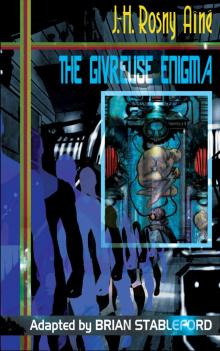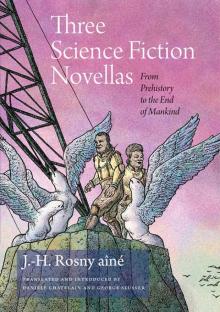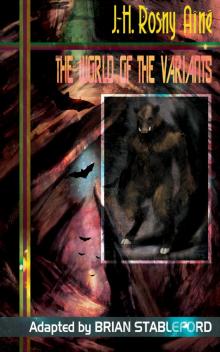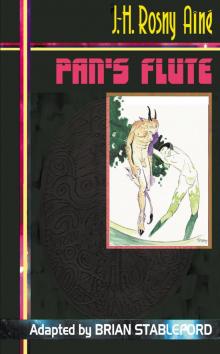- Home
- J. -H. Rosny aîné
The Givreuse Enigma Page 6
The Givreuse Enigma Read online
Page 6
IV.
Spring had returned. Cruel and charming life deployed its meticulous genius; it was the time when growth seemed to crush the earth and the waters—but death was able to limit life, and even to serve life. There was not a tuft of grass where security reigned. Every insect had its predator, an agile scarab or ant-lion crouching in the depths of its trap, which died in their turn beneath the beaks of birds or the teeth of insectivores. The sparrow-hawk, the pine-marten and the owl gorged themselves on fresh blood. Over everything reigned the strange vertical beast which regulated life and death in the forest, the fields, the hills, the mountains and even the gulfs of the ocean.
The destiny of the Givreuses now seemed even more troubled and more fearful. The young men’s anxiety had increased; a new fatality had arrived since the day when one of them had exchanged an obscure vow with Valentine. They were definitely rivals, without wanting to be, without any of the sentiments of hatred and bitterness that comprise rivalry—and their rivalry was all the richer in suffering and dejection. One of them could not sacrifice himself without the other being irreparably unhappy, as if a part of his being had been cut away. That sacrifice seemed impossible; everything within them rebelled against it; life ceased to seem desirable to them.
They loved Valentine as they breathed; one might have thought that their two loves combined and mutually increased one another’s force. When they did not reflect at all, when they simply abandoned themselves to their penchant, without thinking about the future, there was an immeasurable gentleness even in their rivalry; they lived in a present that was exceedingly passionate, charming and pure at the same time. Their love was then confounded with the joy of being young, with the beauty of places, of constellations, of cliffs and the ocean. There were no more plans, hopes, fears; they lost themselves in a conscious, ineffable hypnosis that abolished time…
When reflection, or one of those melancholy reveries that project us into the future, brought them back to reality, when they told themselves that it would eventually be necessary to choose between total renunciation and the effacement of one of them, they fell back into even blacker distress.
No scene like the one on the beach had been repeated, or even sketched out. The attitude struck by “Pierre” seemed strange to Valentine, but less strange than might have been expected. She had not forgotten the dread that she had felt among the granite blocks; she never thought about it without a shiver, in which there was fear, unease and the sense of a mystery more troubling than that of the resemblance between the two men. Her consciousness took note of their slightest actions and their merest words, and only a sensitive delicacy prevented her from spying on them.
Their intimacy betrayed unusual features in every respect. It involved no external demonstration; it was taciturn—they chatted with others, but not with one another. There was no hint of dispute, and even less of contradiction.
Valentine was never as struck by this fact than one afternoon in May, when she was sitting on an oak bench at the far end of the overgrown garden, reading. Pierre and Philippe were out in the garden walking. As usual, they were walking side by side. Sometimes, one or the other would pause to study a plant, an insect or a cloud; then they would smile—and that smile implied a kind of parallelism of sensation and thought. Not once did they speak.
In the end, that silence caused Valentine a veritable malaise, almost anguish. It worked within her confusedly, as at times when one is afloat between a waking state and sleep. She thought she was on the point of divining something—a glimmer flickered back and forth—but then everything became dark again. She was in an unknown existence that tickled her intelligence with enlightenment and her avid heart with trust…
The attitude of Augustin de Rougeterre added to these impressions. That austere man of frank actions and simple words was evidently troubled in the presence of the two young men. A certain fearful and indecisive vagueness was discernible in his gestures, his gaze and his speech—which Valentine usually attributed to the embarrassment he experienced in being unable, like everyone else, to tell Pierre and Philippe apart. On occasion, though, it presented a more complicated enigma. Sometimes, Augustin’s eyes revealed a sort of sacred horror, which was subtly transmitted to the young woman. But why? She could not have even the shadow of a suspicion as to the reality—what human creature could? She thought in terms of mysterious relations; all sort of vague adventures passed through her mind.
On the other hand, it was impossible for her to prefer Pierre to Philippe, and it did not seem to her that she had any right to a preference. She no longer dared to love; she struggled, in distress, against her memories and her inclinations. She thought about running away, of taking refuge far from Givreuse and renouncing happiness. Her affliction, her anxiety and the thousand spiteful shadows that tormented her even in her sleep would, however, have been dissipated—so she believed—if she had not been sure that each of the two men loved her, and in the same fashion, with the same nuances. She wanted to doubt it, but her delicate intuition would not permit it. When she met the gaze of Philippe or Pierre, she read an identical tenderness there; she saw the same hesitation, the same timidity, the same generous sweetness.
The thought of that duplicate love made her blush, as if she had committed a sin. In another person, it might have been confusedly mingled, to some extent, with the equivocal vanity that is found in exceptionally pure women. After all, reverie in a waking state is more or less akin to dream-sleep; how many honest souls sense “rough drafts” of temptation within themselves, whose realization would fill them with horror? It was not like that with Valentine, however. She wished, ardently and constantly, that one of the two would cease to love her. She wanted that one to be Philippe, but she would have accepted it if it had been Pierre.
One morning, Madame de Givreuse went with Valentine, Pierre and Philippe to an abandoned village on the far side of Saint-Michel-les-Loups. It was a sort of pilgrimage. Once, the place had belonged to the domains of the Comte de Rougeterre; one farm a short distance away—the only one that still had tenants—still belonged to the family. Madame de Givreuse had spent some very pleasant days there, which she had not forgotten. Pierre had often been there.
The carriage stopped at the edge of the village. The four visitors sadly considered the houses gathered around a pyramidal bell-tower—a wretched old belfry devoured by moss, lichen and pellitory. An astonishing silence reigned. Almost all of the shutters were closed. There was an occasional glimpse of a window-pane tarnished by time; feral cats hunted among the worm-eaten apple-trees. There was an abundance of spiders and crane-flies. One might have thought that the end of the world had come. Death hovered over the roofs. They pricked their ears involuntarily in search of a human footstep; the absence of children was even more obvious than that of adults.
“We’re in France, though!” murmured Pierre. “Thousands of creatures have no shelter at all. Isn’t it as heart-rending as the ruins of Herculaneum?”
“And sadder!” added Madame de Givreuse.
They went through the village. Jacques Berleux’s farm extended beyond a quincunx of beech-trees. It dated from the monarchy. It had once been a microcosm in which all human industry was represented: carpentry, forge-work, spinning, weaving, cart-building, leather-tanning, brick-making and tile-making. If necessary, the inhabitants would have been able to get by, almost entirely, without the assistance of other humans. A sturdy wall surrounded the orchard, the kitchen garden and the courtyard.
The farmer came forward beneath his centenarian apple-trees. He was an old man, an image of Old France, with shaven lips, prudent eyes and a welcoming smile. He performed a sort of reverence as he said: “M’lady Comtesse…and Monsieur Pierre…I’m at your disposal.” With amazement, however, he slyly studied the two young men. “I’ve heard talk…but I didn’t believe…they’re as alike as two bees…it’s almost a miracle…and I can’t even tell which one is the other Monsieur…”
Philippe was pointed out
to him. He looked at him with admiration and distrust. “It must be a whim of God—that’s not chance, M’lady…what must be must be…and even so, all must be satisfactory to you…given the war, I mean. It’s taken my two sons, Madame!” He had taken his visitors into his reception-room—a long room papered in red, where one of his daughters with noble features, the mouth of a marquise and gloved hands brought bread made from a mixture of wheat and rye, fresh butter, milk, cream, coffee and shortbread to the hearth.
The meal was perfectly charming; it evoked memories of youth that the octogenarians found in the deep recesses of their desiccated brains. Fresh air came in from the orchard and the meadows through two wide-open bay windows. Valentine, Pierre and Philippe were all smiles.
The farmer showed them letters written by his sons. They were dull and monotonous; the same phrases recurred over and over again—but sometimes, like a wolf suddenly appearing on the edge of a wood, a terrible or plaintive image cropped up, vibrant with blood and suffering.
“I don’t complain,” said the old man. “What must be must be, lady…one can’t…” Then, very softly, he began talking about the land. “It yields, but only crumbs…the arms are lacking, m’lady, and mine are beginning to get rusty…the right one has a rheumatism that runs over the shoulder and down to the fingers. Some of the crop was lost, rotted…there’s havoc in the stables…”
Madame de Givreuse knew what the speaker meant. She listened calmly, resolved to give him something, because she deemed him fundamentally honest, while knowing that it was necessary to take the man’s complaints with a pinch of salt. “We’ll see what can be done, Maître Berleux,” she said. “Times are hard for everyone—and we need money for the widows…”
“For the widows, of course, M’lady…but the land, everyone must live…” He sighed. In reality, although the harvest had been mediocre, Maître Berleux had reaped abundant benefits therefrom. English money was streaming along the shore. “Alas,” he went on, “fathers of families who have two sons at the war…at the end of the day, M’lady will see…I know that M’lady loves justice…”
The snack was concluded. “Let’s go see the stables, Maître Berleux,” said Madame de Givreuse. She finished a piece of shortbread and got up. Because it was a matter of money, the young people did not do likewise, but she gestured to Pierre. “Come on,” she said. “It concerns your patrimony.”
Pierre followed her.
Philippe and Valentine were left alone. That rarely happened, and only for very short intervals. This time, it was a snare of destiny; Philippe had no pretext to withdraw.
At first they remained silent. Valentine’s anxiety communicated itself subtly to the young man. Philippe dared not look directly at her; he looked sideways at her beautiful pale face and the long hair spilling out under her hat. His heart was full of an affection so gentle that it seemed to exclude passion.
He remembered an almost identical occasion, a year before the war, when he had been in the same room with his mother and Valentine. Perhaps there had already been love in his heart, but it had been in a nascent state, quite ready to vanish into the vast gulf of possibilities in which so many sentiments are sketched. Valentine was standing at one of the windows. A light breeze came in, causing a large black feather in her hat to quiver; a pearly glow spread over her cheeks; her large eyes displayed the charming indecision of adolescence. He had moved closer; they had exchanged a few words of little significance—but which he still remembered, because they were linked to an internal evolution.
The memory made Philippe’s heart beat faster. The perfume of iris and amber that floated around Valentine was like the pollen of some distant flower. The view was one of extraordinary freshness and delicacy: meadows like the pasturelands of Ireland; a stream straddled by a little bridge covered in the ancient manner; a row of black poplars, Gothic trees that extended steeples tinted with silver and jade toward the sky. It was a mysterious invitation to intimate joy, to peaceful days in which a humble and quiet destiny faded away. “This is a tragic land, though,” he murmured. “A land of spoliation and suffering…like all those the Vikings have passed through.”
She raised her head; their gazes met and turned away.
“How peaceful it seems, though,” he went on. “As if it were an invitation to life.”
“Do you think so?” she said. “In autumn and winter, it’s bleaker than the cliffs—and I don’t much like meadows. I prefer woods…even moorland…”
He shivered slightly. She had just restated, almost exactly what she had said before. He got up and went to the window. A humble warbler was singing somewhere nearby; its voice was full of the promises that such creatures make themselves when Nature is exorable.
Philippe fell into a reverie; the warbler’s voice brought forth deceptive echoes that reawakened memories and vows. A refrain came to his lips without his being conscious of it:
The branch is gilded by the Sun
And bows down to shelter
The buds that are about to blossom
And the bird that is about to sing…
A faint moan made him turn his head. Mademoiselle de Varsennes was standing up, very pale, her eyelids fluttering and her mouth partly open. Her hands were trembling. He understood; his soul filled with fear and darkness. He had just repeated the verse that he had recited when he was Pierre de Givreuse, in front of this same window, where he had stood alongside Valentine.
He took a step forward. She went whiter still; she seemed to be about to faint. Then there was a reaction; her cheeks reddened—but then a sort of vertigo overtook her and she exclaimed, hoarsely: “Who are you? Where did you come from?”
So quietly that she could hardly hear it, he whispered: “Alas, yes! Who am I?”
Feverishly, she went on: “Why did you recite those lines? And why here?”
He did not have the strength to reply immediately; the large eyes fixed upon him inhibited him intolerably. “How do I know?” he said, trying to smile. “The lines came into my memory…what could be simpler?”
Her lips moved, but she said nothing more. Confused suspicions, sharp contradictions and the sensation of the Beyond jostled one another pell-mell. Then two tears ran down her cheeks. Philippe, overwhelmed by love, pity and the dolorous mystery of his life, remained where he was, dejected—and although he knew that he was innocent he felt guilty.
That evening, when the young men were alone, Philippe said to Pierre: “It’s become impossible for both of us to remain at Givreuse. Our double presence is becoming an evil action. The trial to which we’re subjecting Valentine is insupportable; we don’t have the right to prolong it. I’ve never felt it as I did today…” He related what had happened at the farm. “I might have been able to avoid that slip, but will it be possible for us not to commit others—and more serious ones? All our memories are communal; it’s inevitable, in a cohabitation as continuous as ours, that the one who isn’t playing the role of Pierre will end up giving himself away. Even if it doesn’t happen, Valentine will suffer anyway. She knows perfectly well that we both love her.”
These words merely repeated Pierre’s thoughts. He limited himself to replying: “Shall we both leave?”
That was the question that Philippe was asking himself. Even though absence no longer gave rise to physical suffering, he was frightened of separation—but they understood that the logic of their destiny demanded at least a temporary separation.
“Fundamentally, we’re in agreement,” Pierre continued. “We’ll meet up often…”
“Which of us will go?”
“We can’t decide that for ourselves—we have to draw lots.”
The lot selected Philippe.
Disheartened, they rested on their elbows for some time, looking out on the nocturnal garden. A warm breeze was blowing from the sea; clouds moved across the crescent disk of the Moon, giving the scene a febrile but charming life. The young men’s souls were bitter and rebellious. Both were suffering, but Philippe was suff
ering more than Pierre; he was going into a tragic and terrible exile. In the eyes of men, he did not exist; he had never been born. In leaving his mother, it was as if he were renouncing her conclusively; his love for Valentine would be no more than a torture…
Pierre had an immediate sensation of the passion—in both the Latin and Biblical senses—that the companion from which he had scarcely begun to differentiate himself was undergoing. All the thoughts going through Philippe’s head were going through his own. The ordeal suddenly seemed to him to be unbearable. “Don’t go!” he groaned.
“We both know that I must,” replied Philippe. “Let’s obey the law that has divided us, and which is leading each of us to live a different existence. By staying together, we can only render the future more frightful…and Valentine will be irreparably unhappy.”
“This parting might not settle anything, though,” Pierre said, agitatedly. “I’ll be waiting…everything will be in suspense…”
“I expect so,” Philippe replied, sadly. “For a long time, it will be impossible for us to consent to one of our two identities being truly sacrificed for the other. My departure will only be a first trial. Who knows whether it will be beneficial?”
They fell silent, bewildered. Never had existence seemed to them so ominous. Their hands gripped one another, and that grip made them more intensely aware of their unity.
“All the same,” stammered Philippe, “it’s a dream, isn’t it?”
“Or a higher truth,” murmured Pierre.
Thoughts that had haunted their minds a thousand times rose up; they experienced the vast astonishment, the tremulous incredulity, and the indeterminate suspicions all over again. Then it all melted into imperious reality, and their mystery seemed to be nothing but one more petty enigma in the infinite enigma of existence—except that their affliction remained heart-breaking and inexorable.

 Vamireh
Vamireh The Givreuse Enigma
The Givreuse Enigma Three Science Fiction Novellas: From Prehistory to the End of Mankind
Three Science Fiction Novellas: From Prehistory to the End of Mankind Helgvor of the Blue River
Helgvor of the Blue River The World of the Variants
The World of the Variants Pan's Flute
Pan's Flute The Navigators of Space
The Navigators of Space The Mysterious Force
The Mysterious Force